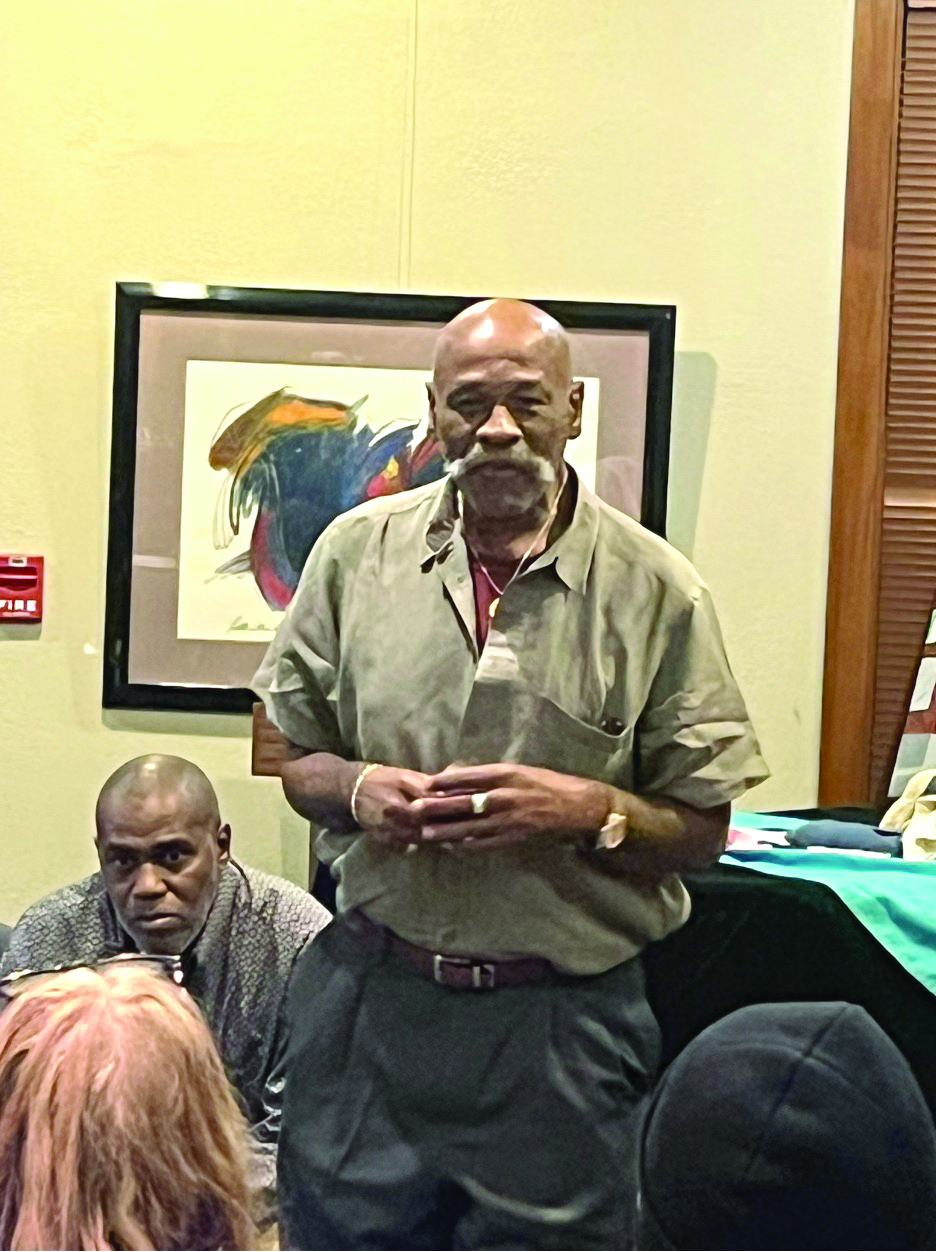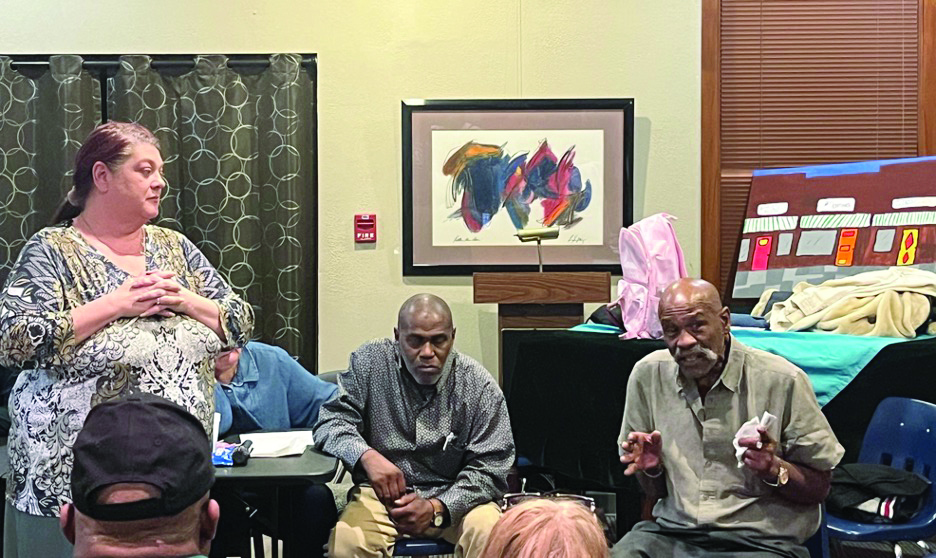
LOCAL & STATE
Jeremy Kuzmarov
The Oklahoma Eagle
Photo Jeremy Kuzmarov
Perry Lott felt like things were starting to fall in place for him in 1987 when he relocated from his home state of Wisconsin to Ada, Okla.
At the time, Lott was developing plans for a green card business. He also wanted to follow his passion for horses by working with them.
But then, Lott’s life was shattered when he was accused of raping a woman at gunpoint. The woman could not make out all the features of her assailant but said that he was a black male between 5’7 and 6’2 and had a gold tooth.
The next day, when police were filming a reenactment video outside the victim’s home, they spotted Lott, who was around the same height as the assailant and had a gold tooth.
Lott told police that he had been with his fiancée the night of the rape. She confirmed his alibi. However, the next day, at a police lineup, the victim identified Lott as her attacker, mainly because he was the only one with a gold tooth (the other men in the lineup were given gold foil from a local flower shop, which the victim could see had been placed there).

Arrest and Conviction
Lott was arrested after the lineup. He was tried and convicted and given a 100-year prison sentence. However, in 2014, the Innocence Project ordered DNA tests of the rape kit, which showed that Lott was not the rapist.
The victim eventually acknowledged that she had been scared to pick the wrong man in the lineup and that nothing specific, apart from the gold tooth, made her choose Lott.
In 2018, Lott was released from prison, and in early October 2023, he was finally exonerated.
On Oct. 28, Lott, now 61, shared his story before a gathering of criminal justice reform advocates about his harrowing ordeal. The event was held at the Church of the Restoration on Greenwood Avenue. Hooked on Justice, an advocacy group for prisoners founded by Emily Shelton, sponsored the event. Lott told the audience that he survived 31 years in prison because he found things to laugh about that kept him from crying and because he knew good people were helping him.
Before his arrest, Lott said he felt he was on track to make it in life and was “God’s gift to mankind.” Then, however, “my whole world spun out of control,” and “I became stuck in a whirlpool he could not get out of.”
Over 31 years in prison, Lott said he must have died 1,000 times; he made a conscious choice, however, to better himself and feels “grateful that G-d ultimately did not abandon me.”
Takeaways from the experience
Lott takes from his experience that, however bad the things that are done to you, “joy cannot be taken, support cannot be stolen, and love cannot be broken.”
When Lott first went into prison, Lott said that he was naïve about the systemic racism that exists in Oklahoma and the fact that “there were people out there who did not want people like him [as an African American] to succeed.”
Lott further said that the current system punishes young people, noting that the “truth [about the injustices in our society] hurts, but by exposing the truth, we can ultimately heal.”
Lott urges people to “stop communicating with hate, pistols, and guns,” and to choose to do good, as those who do wrong will suffer, and those who do good will ultimately rejoice”—as he has been able to do following his release.
Community-Wide Call for Criminal Justice Reform
Lott’s talk was part of a gathering of north Tulsa community activists committed to criminal justice reform.
Brooke Bradley-Saylor, a civil litigation paralegal and who is the founder of the second chance legal movement, emphasized in introducing the speakers that Oklahoma has among the highest incarceration rates per capita in the world and that the state does not try to rehabilitate inmates but punish and humiliate them, which is not correct.
Emily Shelton, head of the non-profit NGO that advocates for humane prison conditions and is a Children’s Advocacy intern at Tulsa County Public Defender’s Office, emphasized that Oklahoma inmates are subjected to harsh labor and deprived of adequate diets.
The practice of solitary confinement is particularly cruel and will drive people insane after 15 days, though the average stay in Oklahoma can be up to three years.
According to Shelton, the U.S. prison population was only around 200,000 until the early 1970s when Richard Nixon declared a War on Drugs. It has skyrocketed since that time, with attendant problems of overcrowding and a decline in prison programs.
Prisons have become big business and an integral part of the U.S. economy, a key reason that harsh crime laws remain on the books.
One of the speakers suggested that GEO Group Inc., a Florida-based company that runs a large private prison in Lawton, contributed money to Gov. Kevin Stitt’s political campaigns.
Darrell Wiggins, who only got out of prison eight months ago after serving a 30-year sentence, emphasized in his talk his efforts to reform the parole system so that inmates would be better informed of what they need to do to achieve parole and so that the parole board is not used as a political instrument by the Governor—as it has often been.
Wiggins further emphasized the importance of providing better mental health programs and educational opportunities in prisons, including for long-term offenders who could benefit tremendously from them.
During a break from the main speakers, testimonials of inmates who were unjustly incarcerated or given excessively long sentences were played on a tape recorder.
A number of the inmates never received proper legal representation and were coerced or intimidated into taking a plea even though they were innocent.
Others have not been able to present new evidence in their case in court.
One man, Michael Lowery, was given a 100+ year sentence in what witnesses identified as an accidental shooting, while another man, Prentice E. Ponds II, was given over 25 years in prison for participating in a relatively innocuous fist fight (where nobody was seriously injured or killed) and after he was allegedly framed for insurance fraud.
Shelley Ware, who runs a program to help inmates prepare for life after incarceration, spoke about Channen Ray Ozell Smith, who is serving a life sentence at Dick Connor Correctional Facility in Hominy, Okla., for a murder he did not commit as another man came forward to confess to the crime and witnesses placed him 30 kilometers away from the scene of the crime.
Lisa Woolley of Broken Arrow also spoke about the ordeal she and her husband endured after they were wrongfully accused of killing their grandchild: the Woolleys are still fighting an uphill battle in court to get custody of their surviving grandchild even when they were exonerated of any wrongdoing and have a track record as loving parents.
These and many other horror stories highlight the need for greater accountability of prosecutors and judges and systemic changes in Oklahoma’s criminal justice system.
Gov. Stitt has helped lower the incarceration rate in Oklahoma for men by 20% and by 30% for women, according to Oklahoma Watch, commuting the sentences of hundreds of people convicted of non-violent offenses.
However, Stitt’s administration, much like former Gov. Mary Fallin’s, has failed to follow through on a voter mandate to reclassify some low-level, non-violent drug offenses as misdemeanors and to channel the savings from lower incarceration rates into mental health and substance abuse treatment.
According to The Oklahoman, zero state dollars have been set aside for this voter-supported initiative, which would be a step in the right direction if implemented.









